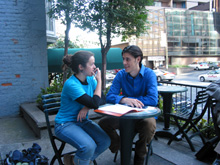Forces Avenir prize for Engineers Without Borders

Diane Cousineau and Phillip Gauthier are out to show that engineering has a heart.
"Science and engineering are not just for nerdy people who want to do math all day," said Cousineau, a fourth-year environmental engineering student. "There is a humanitarian side to engineering that a lot of people have no idea about."
The students are part of the Concordia chapter of Engineers Without Borders (EWB), an organization dedicated to sustainable technology projects in developing countries.
Their group, along with two other EWB university chapters, was recently awarded Forces Avenir’s Prix d’excellence with a $15,000 cheque for their project, Water for the World.
Forces Avenir recognizes young people who are actively involved in community projects and education. The EWB students, from Concordia, École Polytechnique Montréal and McGill, won their category for projects on society, communication and education.
The students visited Montreal high schools and CEGEPs to educate students about local and global water issues — but not in a conventional way.
"If you just throw statistics at kids it really doesn’t have an impact," Cousineau said. "You have to do something that’s more interactive."
The students were split into groups and assigned a country. They were given money and resources according to each nation’s wealth and level of development. The goal was to build a water filter out of simple materials such as charcoal and gravel, with the resources of each country.
"The kids got to see that water doesn’t just appear," Cousineau said. "It’s political. It’s financial."
Gauthier said he was excited to see the conversation the activity inspired.
"It sparked a lot of questions and discussion about water issues. They were surprised by some of the problems."
Going out to talk to kids is one of the best parts of being in EWB. "It kind of gives hope to the kids who want to do sciences but also like working with people," Cousineau said.
Cousineau and Gauthier are active at the university level as well. Every day they are out talking to students.
"Often there is conflict between the engineering and arts students. They don’t really understand each other," Gauthier said.
“The money from the prize couldn’t have come at a better time. They have big plans this year to send an EWB member overseas to do development work. It will be the first time since the chapter started in 2002.
"We put all our efforts into fundraising so that we can get knowledge back from the developing world." Gauthier said.
Cousineau is hoping to be sent overseas this summer. She also has plans for a certificate in environmental auditing.
Gauthier still has a year left in his degree, but he wants to do development work some day. For the moment he is focusing on working in large companies, but he says he would like to eventually join a company more concerned with making sustainable products.
He says the university is the place to change future engineering practices. In the last several years, courses and topics such as environmental stewardship, the impact of technology and the idea of creating accountable engineers have all been added to the curriculum.
Prizes were awarded at a gala in Sherbrooke on Oct. 6.